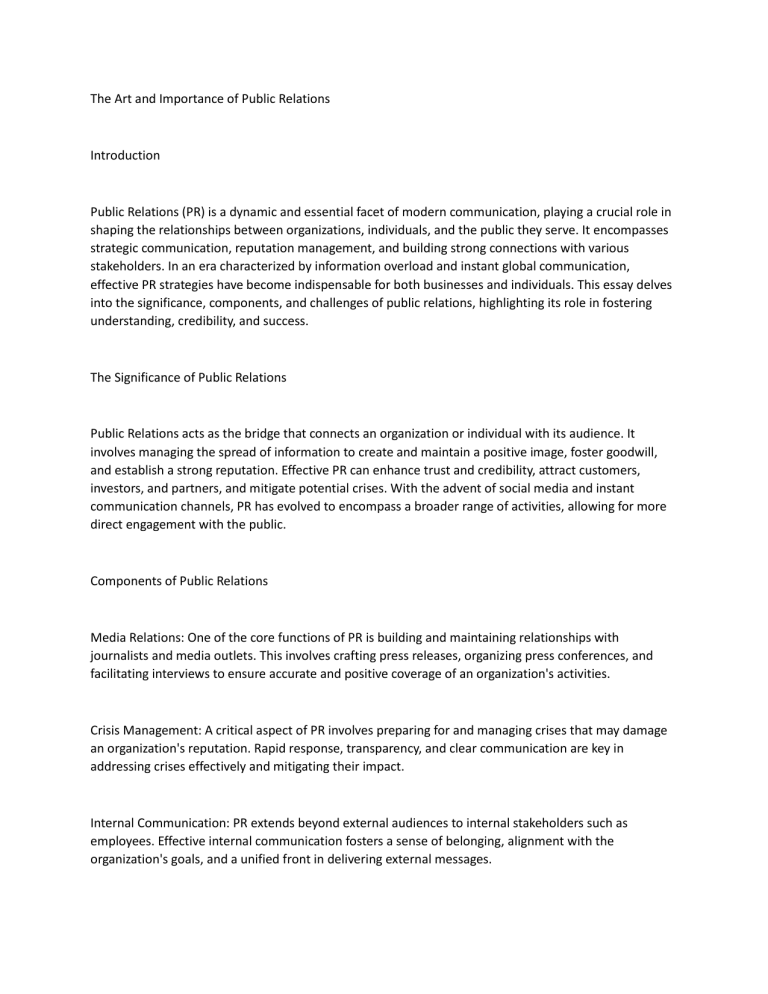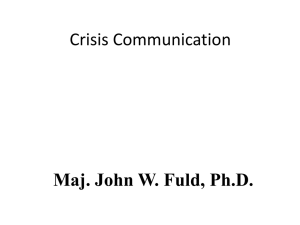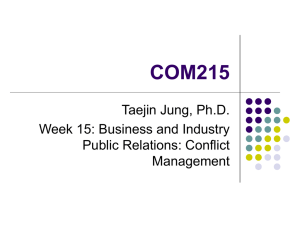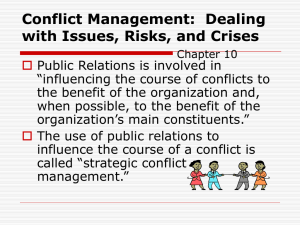
The Art and Importance of Public Relations Introduction Public Relations (PR) is a dynamic and essential facet of modern communication, playing a crucial role in shaping the relationships between organizations, individuals, and the public they serve. It encompasses strategic communication, reputation management, and building strong connections with various stakeholders. In an era characterized by information overload and instant global communication, effective PR strategies have become indispensable for both businesses and individuals. This essay delves into the significance, components, and challenges of public relations, highlighting its role in fostering understanding, credibility, and success. The Significance of Public Relations Public Relations acts as the bridge that connects an organization or individual with its audience. It involves managing the spread of information to create and maintain a positive image, foster goodwill, and establish a strong reputation. Effective PR can enhance trust and credibility, attract customers, investors, and partners, and mitigate potential crises. With the advent of social media and instant communication channels, PR has evolved to encompass a broader range of activities, allowing for more direct engagement with the public. Components of Public Relations Media Relations: One of the core functions of PR is building and maintaining relationships with journalists and media outlets. This involves crafting press releases, organizing press conferences, and facilitating interviews to ensure accurate and positive coverage of an organization's activities. Crisis Management: A critical aspect of PR involves preparing for and managing crises that may damage an organization's reputation. Rapid response, transparency, and clear communication are key in addressing crises effectively and mitigating their impact. Internal Communication: PR extends beyond external audiences to internal stakeholders such as employees. Effective internal communication fosters a sense of belonging, alignment with the organization's goals, and a unified front in delivering external messages. Community Relations: Establishing a strong presence within the community can lead to positive public perception. This involves supporting local initiatives, engaging in philanthropy, and participating in community events. Social Media Management: In the digital age, PR professionals must be adept at managing various social media platforms to engage with the public directly, share updates, address concerns, and build a loyal online following. Influencer Relations: Collaborating with influencers and thought leaders who align with an organization's values can amplify its message and reach a wider audience. Challenges in Public Relations Miscommunication: A lack of clarity in communication can lead to misunderstandings, misinterpretations, and negative perceptions. PR professionals must ensure their messaging is consistent and transparent. Crisis Handling: Crises can emerge suddenly and severely impact an organization's reputation. PR professionals need to act swiftly, truthfully, and effectively to mitigate damage. Digital Landscape: The rapid evolution of social media and online platforms presents challenges in managing an organization's online presence and responding to public sentiment in real time. Negative Publicity: Negative news or reviews can spread quickly, damaging reputation. PR professionals must have strategies in place to address negative publicity and regain public trust. Balancing Objectives: PR efforts must align with broader organizational goals while meeting the needs and expectations of various stakeholders. Conclusion Public Relations serves as a multifaceted tool that shapes perceptions, fosters relationships, and ultimately contributes to an organization's success. Its role has expanded in the digital age, incorporating various strategies to engage with the public effectively. In an interconnected world where information travels swiftly and public sentiment can make or break a reputation, adept PR professionals are indispensable. Through strategic communication, crisis management, and skillful engagement, PR practitioners help build bridges of understanding, credibility, and trust that are vital for the flourishing of organizations and individuals alike.


